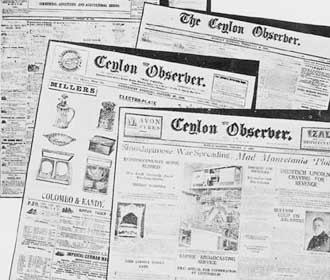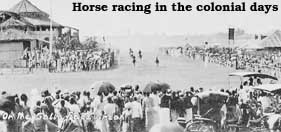

![]()

An octogenarian, seated on a bench at Galle Face Green once told the writer, "In the good ole days of British Colonial rule, we lived in peace, enjoying plenty of cheap bread and butter. When we were granted our political independence in 1948 we were given a constitution based on democracy and on party lines.
This was most unsuitable and did not promote nation building." His words were food for thought.
In 1801, when the Britisher took over from the Dutch by proclamation, Dutch ceased to be the official medium of communication for commerce and the government administration.
The use of the English Language became effective countrywide. Dr. Michael Roberts in his book, Facets of Modern History spells out the attitude there was. In his book he says, "Jeronis Peiris, a pioneer coffee planter indicated his partiality for English education, and the sense of urgency with which he desired his relative Louis Peiris, to have a successful scholastic career in the English Language."
The book also states elsewhere, "Jeronis Peiris knew a knowledge of English meant much power, office and a means of livelihood."
In the wake of such thinking Christian College, Kotte (now over 150 years old), the Colombo Academy (later named Royal College started in about 1845), S. Thomas' College founded in 1851, Trinity College, Kandy not much later, turned out disciplined young men good enough to fit into the British administration and to take positions of responsibility in commerce (in Agency Export Houses) in Galle and in Colombo.
The Buddhist revivalist movement had been born after 1865 which the Christian Missionaries took note of, particularly in The Galle District.
The Panadura Vaadaya (Debate), the visits of Col. Henry Steele Olcott and Madame Blavatsky, the work of Ven. Migettuwatte Gunananda Thera, Ven. Hikkaduwe Sri Sumangala Nayake Thera, the Ven. Weligama Sri Sumangala Nayake Thera, Anagarika Dharmapala, Harischandra Walisinghe, C.S. Dissanayake, Carolis Pujitha Gunewardene, Jeromias Dias, Sir Baron Jayatilleke, Peter de Abrew, Miss Higgins, F.R. Senanayake and P. de S. Kularatne who laboured in the cause of the Buddhist revival by founding the Buddhist Theosophical Society, the Maha Bodhi Society of Ceylon, the Colombo YMBA, Ananda College Maradana, Mahinda College Galle, Musaeus College Colombo, Visakha Vidyalaya and Dharmaraja College Kandy, made the Britisher realize that the people of this country had maturity to conduct their own affairs well.
In this background, when Ramsay McDonald took office as Labour Prime Minister in the early twenties cartoonist Punch produced a memorable picture depicting mother Britannia, dressed in a Victorian ankle length gown with a fringe of lace, carrying in her left hand a lighted lantern, signifying the vision Whitehall had, whilst in the other hand were two roses depicting the Free Press and Democracy.
 Fleet
Street, London, had a battery of newspaper offices, with the old time cable
wires humming all day and night. 7000 miles away, two local newspapers,
The Ceylon Observer had 89 years earlier, along with their cousin, the
Times of Ceylon made an impact on society.
Fleet
Street, London, had a battery of newspaper offices, with the old time cable
wires humming all day and night. 7000 miles away, two local newspapers,
The Ceylon Observer had 89 years earlier, along with their cousin, the
Times of Ceylon made an impact on society.
Like Lord Northcliff, with great vision in 1923, Don Richard Wijewardene of Sedawatte, bought "lock stock and banel" from A.M. & J. Ferguson of Baillie Street, Fort The Ceylon Observer. The Times of Ceylon Illustrated managed by the European Community was founded about that time.
Meanwhile, the Ceylon Daily News was born in 1918 whilst the newspapers mirrored the changing fortunes of our society. The Ceylon Observer and The Ceylon Daily News in particular owned and chaired by D.R. Wijewardene actively agitated for constitutional reforms.
 The
Saturday Horse races were often spotlighted. One newspaper reported: "Very
few people came to the races on Saturday and women were in a minority.
The absence of the band due to His Excellency's bereavement was much felt,
but it was a lovely afternoon. Few pretty frocks were to be seen. Miss
Meadan wore a striking dress of amethyst satin charmouse, made with a long
tunic and the bodice had lace sleeves."
The
Saturday Horse races were often spotlighted. One newspaper reported: "Very
few people came to the races on Saturday and women were in a minority.
The absence of the band due to His Excellency's bereavement was much felt,
but it was a lovely afternoon. Few pretty frocks were to be seen. Miss
Meadan wore a striking dress of amethyst satin charmouse, made with a long
tunic and the bodice had lace sleeves."
How charming and elegant she was. Some of the well trained horses, "Warriors Call", "Helter Skelter", "Good Win" and "Cotton Hall" were often favoured to win. The last named horse won the coveted Governors Cup thrice in successive years.
The newspapers often reported about the Colombo Academy (later known as Royal College), which institute had the patronage of all Governors. Founded by the Revd. Marsh, the College catered for the British, Burgher, "upper class" Sinhala and Tamil boys. Children of the Colombo Chetty community who had done well in business and at the Pearl Fisheries off Mannar were also admitted. In the early years, the Governor had been the Chief Examiner!
An interesting happening now long forgotten, but worth recalling was when Editors of newspapers had to refute (by compulsion) an unfounded story that had gained currency.
After the first World War (1914-18) the hostility felt by the British community in 1923 towards the defeated Germans was still hot.
There was a rumour that the Colombo war memorial had been built with German cement, which was not true, although a German cargo boat "The Kaiser Wilhelm II" had transported the cement from Liverpool to Colombo.
Again, the famous jail break at Bogambara by a group of Samasamajists was "great news" of British times. This happening embarrassed the Governor.
The good ole days will never dawn again. They who have lived through peaceful times do miss the communal harmony there was, the simple ways of living.
The Police Band was a "must" for all fashionable society functions and weddings and when the curtain fell (as it literally did on 4, February 1948) they would play, "God Save The King!".
Continue to Plus page 9 * 'What independence, what freedom?'
Return to the Plus contents page
![]()
| HOME PAGE | FRONT PAGE | EDITORIAL/OPINION | NEWS / COMMENT | BUSINESS
Please send your comments and suggestions on this web site to
info@suntimes.is.lk or to
webmaster@infolabs.is.lk